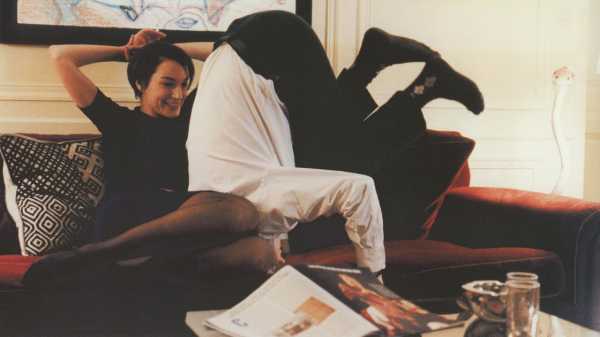
Twenty years ago, revival houses were dying, and the distribution of foreign and independent films was becoming an ever tougher proposition. Many of the best foreign films that I saw in the nineties were (and remain) undistributed here, but one of them, at least, is making an all-too-rare appearance, on Tuesday, at French Institute Alliance Française: “Dieu Seul Me Voit” (“Only God Sees Me”), from 1998, the director Bruno Podalydès’s first feature, which stars his brother Denis Podalydès (they wrote the script together) and the actress Jeanne Balibar. (The screening kicks off a two-month series devoted to her work.) Having seen the film again in anticipation of Tuesday’s screening, I can attest that the joy of rediscovery is as strong as that of the first viewing.
“Only God Sees Me” gets a kick from its overlay of genres: it’s a classic young person’s first film, set in the Podalydèses’ home town of Versailles (not the palace, of course, but a residential part of the city), a story of romantic aspirations and erotic desires, deceptions and betrayals, rising passions and fading attachments, and the tribulations of new adult responsibilities. It’s one of the idiosyncrasies of the highly professionalized and stepwise French movie industry that the director and the actor were already past the first flush of youth and nearly middle-aged—thirty-seven and thirty-five, respectively—when they finally had the opportunity for this stock-taking. (The film’s delayed gestation may, however, have contributed to its urgent artistry: it teems with experiences and observations that the filmmaker seems to have held under pressure and released here with a furious but precisely focussed outburst of creative energy.) It’s also a political film, with scenes set in the hands-on milieu of electoral politics, featuring extended sequences documenting the distinctive French way of voting, fictitious candidates and real-life journalists, and political discussion and political protest. And it’s a masterwork of subtle absurdities, local peculiarities, and outrageous incongruities—it’s one of the most physically inventive comedies since the heyday of Jacques Tati.
Denis Podalydès plays Albert Jeanjean, a sound recordist who works on documentaries and lives alone, in a one-room top-floor apartment. He also holds a part-time job as a polling-place clerk. (The movie’s action is framed by two local elections—the first round and a runoff, which are spaced two weeks apart.) The opening shot, a street ballet of neurotic indecision that’s done in a single shot of intricately panning, tilting, swooping, and gliding audacity, sets the tone for the action that follows.
There’s some inside-cinema comedy: an on-location interview in Toulouse with the city’s mayor goes awry when Albert, the sound man, begins to fiddle with the image, and, back home, Albert is invited to a gala première of an art film that turns into a social fiasco. But the main drama is romantic. Albert, slightly bewildered and deeply embarrassed, lives with an amiable frown to hide his wide-eyed panic, like an actor thrust onto the stage of life without knowing his lines. He’s a romantic guy living without love, a horny guy living without sex; he’s always on the lookout, but sweetly, sentimentally, self-doubtingly. (Even the title suggests the crises of uncertainty that shadow even his most private and solitary moments.)
The story is set in motion when, in Toulouse, after the shoot ends, Albert and a friend, having nothing to do, drop in on a medical van and give blood. The scene builds to peak after peak of squirm-inducing, precisely composed yet freely performed quiet flashes of antic delight (the choice of music plays a big role in the comedy)—as well as to a flirtation with a nurse named Sophie (Isabelle Candelier) that leads to a date, and then to another man’s jealousy, and then to a chain reaction of self-surpassing inventiveness, blending behavioral comedy with real menace, giddy logic with gestural precision.
There are childhood reminiscences and lifelong regrets, short-term schemes and sudden plunges of near-catastrophic awkwardness that, in various sequences of carefully stage-managed lunacy, highlight absurd comedic crises of indecision in petty but embarrassing disasters. Whether he is standing at a street corner, boarding a train, or choosing a shirt, Albert’s inability to make decisions, and the decisions that nonetheless result, lead with a strange, nearly metaphysical order to a round of emotional, political, and romantic complications that come to resemble a life. His troubles mount when his tenuous fling with Sophie is followed, in Paris, by an encounter with a filmmaker named Anna Festival (Balibar)—a well-connected intellectual whose reputation as a femme fatale is belied by her graceful, assertive generosity—and another one with Corinne (Cécile Bouillot), a friend’s girlfriend, who’s a bit mysterious about her work.
The romantic adventure is leavened with a practical view of work (one friend sells travel packages in a train station from a rotating palm-tree-decorated platform; another needs Albert’s fondue pot for a political meeting) and of play (friends getting together to watch a soccer game on TV with an air of lighthearted dalliance—instant replay has rarely had a more romantic charge), of daily annoyances (parking a car on the streets of Paris) and of looming troubles (riot police breaking up a demonstration). There’s also a major Tintin riff (it gives rise to a long, queasy scene in a restaurant), some bathroom humor (not gross, just wry), and some exuberant notions of sexual playfulness. Above all, there’s a sense of a teeming, overwhelmingly urgent imaginative drive, illuminated by a sense of wonder and delight—and capped by an exquisite last line. If the movie has a flaw, it’s the sense that, at nearly two hours, it’s a little too short, and leaves out too many aspects of Albert’s odd existence and character in pursuit of a taut comedic line holding together its many unstrung moments.
The gaps in “Dieu Seul Me Voit” were a product of its unusual method of creation and are a mark of its prodigious origins. The Podalydès brothers wrote a three-hundred-page script, and the first cut of the film was two four-hour films. (A six-hour version, made up of six hour-long episodes, was released on DVD in France, in 2008; I haven’t seen it, but I’m impatient to.) The non-release of “Dieu Seul Me Voit” in the United States has deprived viewers of a vital and exhilarating comedic experience. What’s more, the few subsequent films by Bruno Podalydès that I’ve seen don’t match this one in inspiration—though he has had a busy career, and it’s entirely possible that the best of them have, like this one, have remained mainly unavailable here.
Sourse: newyorker.com






